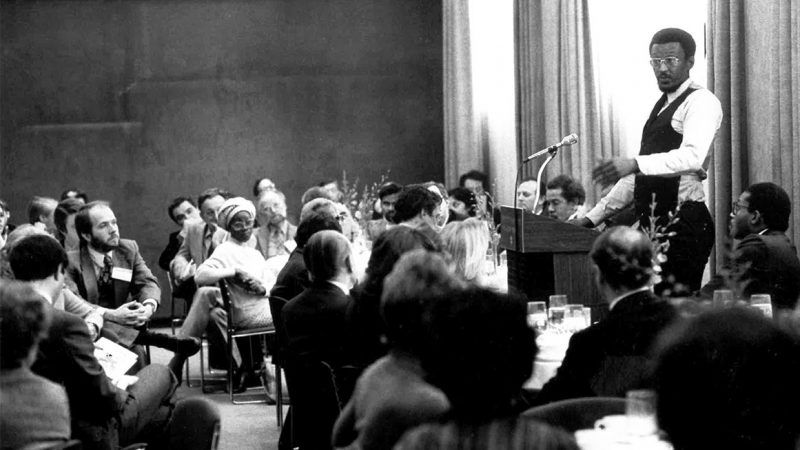Walter Williams, RIP
The free market economist and iconoclast died in December at the age of 84.

Walter Williams, the free market economist and iconoclast, died in December at the age of 84. The author of 13 books, Williams was best known for 1982's The State Against Blacks, which documented how government interference in the market has been especially harmful to African Americans.
Born in 1936, Williams grew up in the Richard Allen Homes, one of Philadelphia's first housing projects. When he was a small child, his father left his family. He was brought up by his mother, a high school dropout, and the family spent time on welfare. Williams would later draw a distinction between material poverty and what he called "poverty of the spirit."
He worked as a taxi driver in the City of Brotherly Love and was drafted into the peacetime Army. After his military service, Williams studied economics at California State College and then went to UCLA for graduate school, where he was exposed to the ideas of Milton Friedman, James Buchanan, and his own department chair, Armen Alchian. In 1977, Williams started writing a weekly column, which was eventually syndicated in 140 newspapers. He was also a Reason contributor and trustee emeritus on the board of Reason Foundation, the nonprofit that publishes this magazine.
For all his individual accomplishments, Williams was especially proud of his role in making George Mason University's economics department a home for free market radicals. "GMU Econ has lost an iconic and heroic figure," wrote Peter Boettke, director of the school's F.A. Hayek Program for Advanced Study in Philosophy, Politics, and Economics. He added that Williams "taught with wit and passion the logic of economic reasoning."
Reason's Nick Gillespie interviewed Williams in 2011. An excerpt from their conversation follows.
Q: Do you think the roundabout way you got your economics education was better for you than if you'd been a childhood whiz kid and gone straight to college after high school?
A: If I'd gone to college right after high school, it would have been an unmitigated disaster. I was too immature. I was unprepared to make the sacrifices necessary. I think that's true for many people. My daughter was 17 years old and went right into college. If we had to do it again, I would have gotten her a job at a McDonald's or a carwash for a couple years to let some maturity set in. So maybe take a year or two and then go to college. But more importantly, pay your own way.
Q: You mention college subsidies quite often. The state university system in California was essentially free in the 1960s and 1970s. Wasn't that a good thing, even if it was appropriated from taxpayers?
A: No, it's not a good thing!
Q: Would you have been able to go to college otherwise?
A: I might not have. A lot of the incentive for my wife and I to move from Philadelphia to Los Angeles in 1961 was that no way in the world could I afford to go to Temple University. It was the cheapest school in the city, and it was like $2,000 a year. I went to Cal State Los Angeles, and it was $125 a year, I believe. So I got a highly subsidized education.
I don't know whether I would've got an education. But still, because I got an education doesn't mean it was a good idea to rip off California taxpayers.
Q: If you take a cost-benefit analysis of the cost to taxpayers of you attending college, and then what you've paid back in taxes—
A: Not to the California taxpayers. When I finished ripping them off, I left [the state].
Q: How did you help build George Mason's economics department into a hotbed of research from a libertarian perspective?
A: When James Buchanan won the Nobel Memorial Prize in Economic Sciences in 1986, we had 26 faculty members. When I became department chairman [in 1995], we had 18. There was considerable hostility toward our department. I tried to work with the administration to rehire those people, and I had a lot of difficulty, so I just said, "Well, the only way I'm going to improve the department is try to privatize the department and go out and raise money to hire people and subsidize hiring people." A lot of it was from the result of the generosity of supporters like the Lilly Endowment and the [John M.] Olin Foundation.
Q: People in the academy said this was a corporate takeover.
A: It was not a corporate takeover. The people who gave money respected me and my ambitions, and I had complete say over how the money was spent.
Q: Do you feel that you're part of the libertarian movement?
A: No, I don't. I'm not part of a movement. I've never been part of a movement. I just do my own thing.
This interview has been condensed and edited for style and clarity. For an video version, visit reason.com.


Show Comments (47)